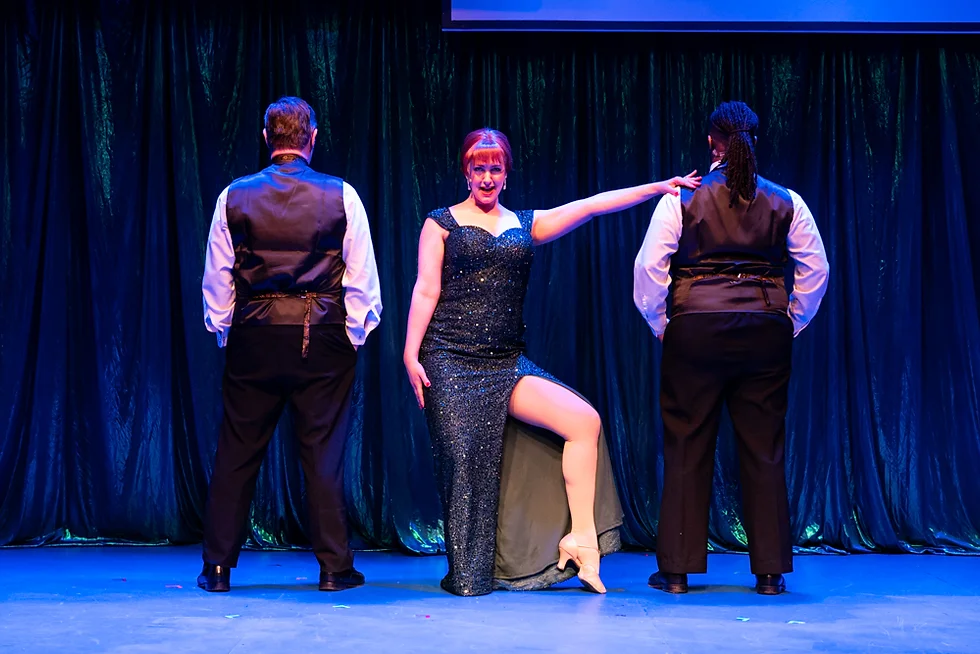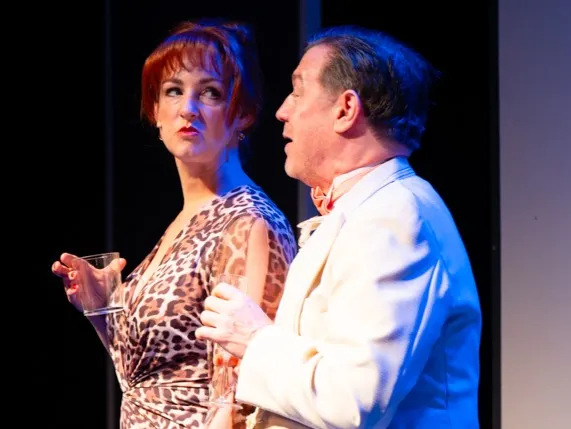Copps and Copps Chronicle Five Years of Love and Loss
- Anthony Chase

- Jan 12
- 7 min read
Updated: Feb 25
The Last Five Years at MusicalFare
REVIEW by ANTHONY CHASE

The Last Five Years at MusicalFare’s Premier Cabaret is a song cycle by Jason Robert Brown about the five-year rise and demise of the relationship between Jamie Wellerstein, a writer, and Cathy Hiatt, an actor.
Steve and Kelly Copps, a married couple in real life, assay the roles, and as is always the case in any two-hander, The Last Five Years becomes a showcase for their remarkable talents and onstage chemistry. I am one of those who was convinced that this duo was simply not aging, a myth that was exploded by the use of actual photos of when they were first dating, used in this production. Good Lord, they were children!
Jamie’s story is told in chronological order, from beginning to end. Cathy’s is told in reverse chronological order, beginning after the breakup of their marriage, and working its way back to when they first met. Songs alternate between the two performers, who meet, midway for a duet.
Dedicated theater goers in Western New York are well familiar with Steve and Kelly Copps.
He is arguably Buffalo’s foremost leading man of musical theater with a litany of memorable roles to his credit. In shows like Once, Kinky Boots, Peter and the Starcatcher, and Beauty and the Beast, there is Steve Copps, prominently featured in a standout role.
She is a member of the sprawling theatrical Jakiel clan. Her parents are actors Mary McMahon and Steve Jakiel. Kelly’s sister, Amy Jakiel is an actor, and her husband, Philip Farugia is an actor and musician. Even at this performance I was seated at a table with a Jakiel cousin married to the sister of a prominent local artistic director. Yes, Chris Handley, artistic director of the Alleyway Theatre is related to the Jakiels by marriage. In the Buffalo theater community, we find the Jakiels everywhere.

I would like to take a moment to talk specifically about Kelly Copps née Jakiel.
Eyes have been on Kelly since she was a university student and knocked it out of the park with the UB production of City of Angels in 2007. She ascended quickly and was the princess darling of the theater community. She is one of the co-founders of Second Generation Theatre, and you can guess how they came up with that name. Their debut production featured her incandescent turn as Cinderella in Sondheim and Lapine’s Into the Woods. Soon, however, she began to retreat a bit into the producer’s office. It is also possible that becoming the mother of two young children altered the priorities and limited her availability. She produced, she choreographed, and she took on more serviceable roles; her turn in Nine comes to mind. She also made a successful foray into playwriting, scripting "The Bowling Play," which was a big hit for Second Generation.

During this time, her younger sister, the ubiquitous and astonishingly talented Amy Jakiel, emerged from her elder sister’s shadow to conquer Buffalo theater with one starring role after another: Kate/Lucy in Avenue Q, Joanne in Rent, Nancy in Oliver!, Marian Paroo in The Music Man, Reza in Once, and Beard in Kragtar: an American Monster Musical. For years, she has served as co-host of the Artie Awards, honoring excellence in Western New York theater.
Now, however, Kelly Copps has suddenly begun to reclaim her place in the spotlight. She was sensational as Ulla in The Producers at Lancaster Opera House (with her husband as Franz Liebkind). She finally won an Artie for her stunning turn as manipulative Gussie in Merrily We Roll Along for Second Generation. And now, with this tidy little Jason Robert Brown showcase, she completes a trifecta of perfect performances, confirming that her crown is firmly back on her head.
The Last Five Years is decidedly tilted in the woman’s favor. Yes, she does accuse him of infidelity prematurely and she does become petulantly frustrated that her career is stalled while his is skyrocketing, and there might be a bit of self-fulfilling prophecy to what happens, but … he does leave her for the very woman who caused her to worry, and there is no evidence that he supports her career very much. He doesn’t even go to see her show in Ohio. Yes, she’s the good one; he’s the jerk. Even Steve Copps’s exquisite performance of “The Schmuel Song,” in which he promises to support her artistic dreams, fails to win me to his side. Mr. Copps imbues the number with his signature charm, and we believe that he believes in his own sincerity, but given the show’s double-tracked construction, we already know that the train he’s steering into the station is destined to leave just as quickly.

Still, Jamie Wellerstein may not offer much support to Cathy Hiatt, but Steve Copps gives a polished and generous turn that, in every way, sets Kelly Copps up to shine. This is as much a testament to the skill of director Eric Deeb Weaver and music director Theresa Quinn, as it is for Mr. Copps, for the two actors are almost never on stage together. The contours and cracks in the relationship must be established through comparisons and contrasts, and through the momentum of the alternating songs. This production is especially satisfying in this regard, as it highlights and punctuates the thematically linked numbers.
To be specific, Jamie's songs tend to be more energetic, and frequently deploy humor and wit, particularly in songs about his rising career and romantic pursuits. This musical approach reflects his confident, forward-moving personality and career trajectory. Cathy's songs, in contrast, tend toward introspection and emotional depth as she navigates her struggle with career setbacks and relationship challenges. Her humor is more sardonic. Quinn and Deeb Weaver guide Copps and Copps to performances that emphasize these aspects of the piece.
The contrast is particularly evident in how each character approaches similar themes. Jamie's "Moving Too Fast" is an exuberant, pop-rock celebration of his career success, filled with rapid-fire lyrics and a driving beat. In contrast, Cathy's "Climbing Uphill," which describes her career frustration, uses a more complex melodic framework to convey her audition struggles, incorporating both internal monologue and external performance.
Jamie's "The Schmuel Song" is a playful, storytelling piece that highlights his charm through an upbeat klezmer-influenced style. Meanwhile, Cathy's "Still Hurting" is a raw, emotionally vulnerable ballad that strips away pretense to reveal deep pain.
Even in lighter moments, the contrast is clear: Jamie's "Shiksa Goddess" is an externally focused, humorous celebration with a bouncy, contemporary feel, while Cathy's "A Summer in Ohio" balances comedy with underlying loneliness while revealing her need for a kind of validation from Jamie that we already know will not be forthcoming.
The beginning of their relationship is captured differently as well: as performed by Steve Copps, Jamie's "The Next Ten Minutes" portion is assured and declarative, while Kelly Copps performs Cathy's part in the same song (their only duet) with an air of questioning and wonder. Still, both are expressing love, which is particularly poignant as this is the only moment their timelines intersect, and the moment on which the entire musical pivots.
Each actor faces an opposite challenge in presenting this material. Jamie is guiding the audience forward through a narrative, but the outcome has already been revealed by Cathy in the opening number. Cathy, on the other hand, presents Kelly Copps with the challenge of imbuing her character with increasing joy and hope as she works through her doomed relationship backwards. Each performer conquers the challenge at hand with impressive skill.
Vocally, both navigated the material with assured command. There are choreographic moments that were not yet second nature to Mr. Copps’s body on opening night, but the exuberant blue-eyed charisma of this actor could convince me that his endearing moments of awkwardness were entirely intentional and devised to soften and humanize his devotedly careerist personality.
The intimacy of the Premier Cabaret space, which I will miss tremendously when MusicalFare moves downtown, proves to be the perfect setting for this deeply personal musical. Under Eric Deeb Weaver's direction and Theresa Quinn's musical guidance, The Last Five Years becomes more than just another iteration of this frequently produced show. The real-life connection between Steve and Kelly Copps adds layers to their performances, even as they spend most of the evening apart. While the show's structure is arguably gimmicky, here it serves to illuminate the ways in which two people can experience the same relationship so differently. In their hands, this double helix of a narrative reveals not just the dissolution of a marriage, but the peculiar way memory works in reverse - how hope can look like delusion in hindsight, and how love can persist right until the moment it conflicts with ambition.
Performed without intermission, The Last Five Years continues at MusicalFare Fridays and Saturdays at 8 p.m. and Sundays at 2 p.m. through January 26, 2025. Tickets are available at www.musicalfare.com .
CODA: There are numerous shows in which I would enjoy seeing the Jakiel sisters together. Imagine Kelly Copps and Amy Jakiel as Regina and Birdie in Lillian Hellman’s Little Foxes (either one in either role). As Phyllis and Sally in Follies. As Desiree and Charlotte in A Little Night Music. As Brooke and Silda in Other Desert Cities. And there actually is a third Jakiel sister – dare I suggest Anton Chekhov?






